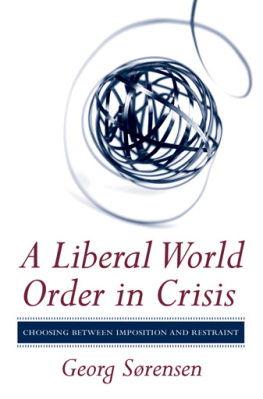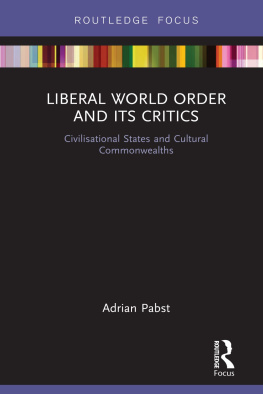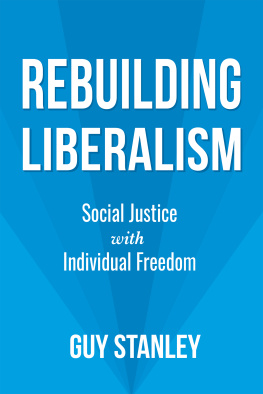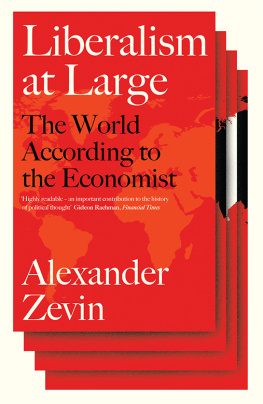
Preface
Most of the 1990s was a honeymoon period for liberal thinking about international affairs and for liberal politics: the Cold War had ended with liberal victory, and that created great expectations for a long phase of sustained progress for liberal democracy, liberal international institutions, the liberal world economy, and liberal values. By the turn of the century, or even earlier, it was clear that any such hope for liberal progress rested on a much shakier foundation than most people had believed. It was at that point I began investigating the idea that tensions inside liberalism might be a major source of impediment to liberal progress. In particular, it became clear that liberal advance itself contains elements that may serve to undercut further liberal progress. I continue to believe that the progress that liberal theory talks about is possible in principle, but for reasons set forth in this book I am much more skeptical about any notion of facile advance toward a more liberal world order. Liberal progress is not merely predicated on formulating good policies; it is also dependent on dealing successfully with deep tensions in liberal principles themselves. I seek to explain why that is no easy task.
The overall argument has not appeared in print previously, but some of the themes contained in this book have been set forth in articles in scholarly journals and in book chapters. A number of ideas have also been presented at conferences and seminars. My thanks go to editors, reviewers, and participants; they have greatly inspired and enriched my understanding of the subject.
The relevant earlier publications are the following: What Kind of World Order? The International System in the New Millennium, Cooperation and Conflict 41:4 (2006), 34364 (chapter 1); Liberalism of Restraint and Liberalism of Imposition: Liberal Values and World Order in the New Millennium, International Relations 20:3 (2006), 25172 (chapter 2); After the Security Dilemma: The Challenges of Insecurity in Weak States and the Dilemma of Liberal Values, Security Dialogue 38:3 (2007), 35778 (chapter 3); Antinomies of Liberal World Order: Liberal Dilemmas at Historys End, seminar paper, Danish Institute for International Studies, Copenhagen, 2009 (chapter 3); Changes in Statehood: The Transformation of International Relations, Basingstoke: Palgrave Macmillan, 2001 (chapter 4); Free Markets for All: The Difficulties of Maintaining a Stable Liberal World Economy, in Governing the Global Economy: Politics Institutions and Economic Development: Essays in Honor of Helge Hveem, ed. Dag Harald Claes and Carl Henrik Knutsen, London: Routledge, 2011 (chapter 5).
Colleagues in the International Relations section at the Department of Political Science in Aarhus have provided help and encouragement. The Department, as well as Aarhus University Research Foundation, generously supplied economic support. A Guest Professorship at the WZB (Social Science Research Center), Berlin, during the spring of 2007 offered important input for the project. The WZB Research Unit on Transnational Conflicts and International Institutions was a very fruitful context for thinking about world order issues. My thanks to President Jrgen Kocka, Director Michael Zrn, and his colleagues, Martin Binder, Mathias Ecker-Ehrhardt, Susanne Fuchs, Kristina Hartwig, and Helmut Weidner. The BG Bank Foundation kindly made their Berlin guest apartment available for the stay.
Writing this book turned out to be a somewhat more difficult task than I had anticipated. I am deeply grateful, and much indebted, to colleagues who carefully read earlier drafts of the manuscript. They offered a large number of suggestions for improvements; my thanks to Francis Fukuyama, John Ikenberry, Peter Katzenstein, Judith Kelley, and Jan Zielonka. At Cornell University Press, Roger Haydon supported the project with unfailing help and advice. Susan Tarcov was a terrific copy editor and Susan Specter was a superb manuscript editor.
Martin B. Carstensen did an excellent job in putting together an overview of liberal world order literature. So did Jacob Hartmann Srensen in reading and correcting the manuscript for typos and other errors. Annette Andersen once again expertly took care of all the technical details.
Thanks once more to my wife, Lisbet, for keeping me alive during the project. The book is dedicated to my grandchildren, Jonas and Tobias, and their father, Jacob. Thanks to the boys for engaging me in activities and appreciating my company in ways that had nothing whatsoever to do with whether or not I would eventually complete this book.
Introduction
The Argument
The current world order is more liberal than any previous order in history: it is dominated by free, democratic states, there is almost universal support for a state-market arrangement based on private property and free market exchange, and a vast network of international institutions articulate and support liberal doctrines. At the same time, progress is much less secure in many areas than it might seem at first glance; for example, democracy is not making significant progress in a large number of countries, and any global commitment to liberal principles and values remains thin and uncertain. In contrast to early end of history optimism, liberal principles compete with each other and there is no simple path to liberal progress. It is in this complex situation that liberal states are called upon to answer a fundamental question about the real content of world order: what is it that liberal principles have to offer peoples and countries, and what does it mean to have an order based on freedom and rights?
Liberal democracies offer two fundamentally different answers to this question. One affirms the universal validity of liberal values, as expressed in the United States national security strategy of 2002: the United States must defend liberty and justice because these principles are right and true for all people everywherethe United States must start from these core beliefs and look outward for possibilities to expand liberty. I label this strategy a Liberalism of Imposition. It contains an imperialist element to the extent that it employs power to secure the expansion of liberal principles; imperialism, says Samuel Huntington, is the necessary logical consequence of universalism. I demonstrate that Imposition offers no secure basis for a stable order.
The other answer stresses a different set of liberal values: pluralism, nonintervention, respect for others, moderation, and peaceful cooperation on equal terms. I label this strategy a Liberalism of Restraint. Several commentators argue that the United States and the other consolidated democracies successfully pursued a Liberalism of Restraint strategy during the Cold War and that a stable world order will be (re)established by returning to this posture. I demonstrate why there is no easy pathway to a stable Restraint order: because of recent economic and political developments, liberal states have been weakened and speak with less clout in the world. Furthermore, a Restraint order is simply not sufficient to address the core challenges that a well-functioning order must confront today.
Imposition is too much and Restraint is too little: that is the liberal dilemma. It is not new because the tension between Imposition and Restraint has been present in the liberal tradition from the beginning. But it is particularly pertinent today because the leading democracies must take on the responsibility for creation of a stable world order; no one else can, or will, shoulder the task.








 Contents
Contents Preface
Preface